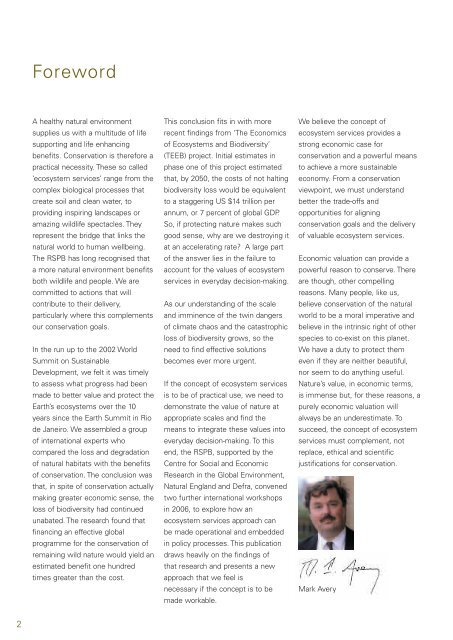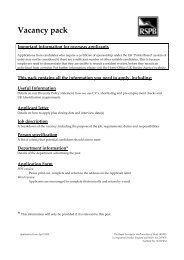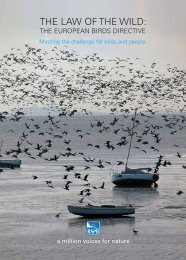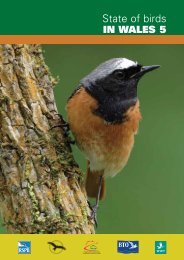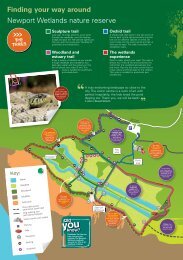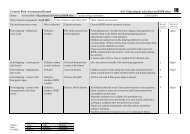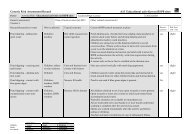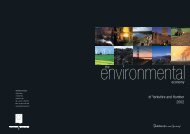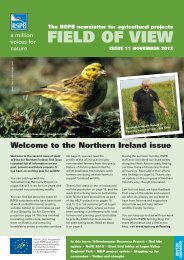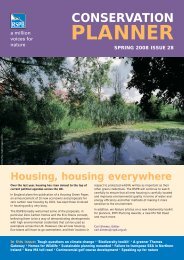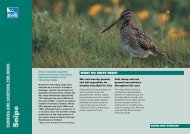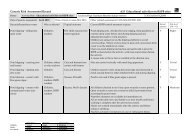Naturally, at your service: - RSPB
Naturally, at your service: - RSPB
Naturally, at your service: - RSPB
You also want an ePaper? Increase the reach of your titles
YUMPU automatically turns print PDFs into web optimized ePapers that Google loves.
Foreword<br />
A healthy n<strong>at</strong>ural environment<br />
supplies us with a multitude of life<br />
supporting and life enhancing<br />
benefits. Conserv<strong>at</strong>ion is therefore a<br />
practical necessity. These so called<br />
‘ecosystem <strong>service</strong>s’ range from the<br />
complex biological processes th<strong>at</strong><br />
cre<strong>at</strong>e soil and clean w<strong>at</strong>er, to<br />
providing inspiring landscapes or<br />
amazing wildlife spectacles. They<br />
represent the bridge th<strong>at</strong> links the<br />
n<strong>at</strong>ural world to human wellbeing.<br />
The <strong>RSPB</strong> has long recognised th<strong>at</strong><br />
a more n<strong>at</strong>ural environment benefits<br />
both wildlife and people. We are<br />
committed to actions th<strong>at</strong> will<br />
contribute to their delivery,<br />
particularly where this complements<br />
our conserv<strong>at</strong>ion goals.<br />
In the run up to the 2002 World<br />
Summit on Sustainable<br />
Development, we felt it was timely<br />
to assess wh<strong>at</strong> progress had been<br />
made to better value and protect the<br />
Earth’s ecosystems over the 10<br />
years since the Earth Summit in Rio<br />
de Janeiro. We assembled a group<br />
of intern<strong>at</strong>ional experts who<br />
compared the loss and degrad<strong>at</strong>ion<br />
of n<strong>at</strong>ural habit<strong>at</strong>s with the benefits<br />
of conserv<strong>at</strong>ion. The conclusion was<br />
th<strong>at</strong>, in spite of conserv<strong>at</strong>ion actually<br />
making gre<strong>at</strong>er economic sense, the<br />
loss of biodiversity had continued<br />
unab<strong>at</strong>ed. The research found th<strong>at</strong><br />
financing an effective global<br />
programme for the conserv<strong>at</strong>ion of<br />
remaining wild n<strong>at</strong>ure would yield an<br />
estim<strong>at</strong>ed benefit one hundred<br />
times gre<strong>at</strong>er than the cost.<br />
This conclusion fits in with more<br />
recent findings from ‘The Economics<br />
of Ecosystems and Biodiversity’<br />
(TEEB) project. Initial estim<strong>at</strong>es in<br />
phase one of this project estim<strong>at</strong>ed<br />
th<strong>at</strong>, by 2050, the costs of not halting<br />
biodiversity loss would be equivalent<br />
to a staggering US $14 trillion per<br />
annum, or 7 percent of global GDP.<br />
So, if protecting n<strong>at</strong>ure makes such<br />
good sense, why are we destroying it<br />
<strong>at</strong> an acceler<strong>at</strong>ing r<strong>at</strong>e? A large part<br />
of the answer lies in the failure to<br />
account for the values of ecosystem<br />
<strong>service</strong>s in everyday decision-making.<br />
As our understanding of the scale<br />
and imminence of the twin dangers<br />
of clim<strong>at</strong>e chaos and the c<strong>at</strong>astrophic<br />
loss of biodiversity grows, so the<br />
need to find effective solutions<br />
becomes ever more urgent.<br />
If the concept of ecosystem <strong>service</strong>s<br />
is to be of practical use, we need to<br />
demonstr<strong>at</strong>e the value of n<strong>at</strong>ure <strong>at</strong><br />
appropri<strong>at</strong>e scales and find the<br />
means to integr<strong>at</strong>e these values into<br />
everyday decision-making. To this<br />
end, the <strong>RSPB</strong>, supported by the<br />
Centre for Social and Economic<br />
Research in the Global Environment,<br />
N<strong>at</strong>ural England and Defra, convened<br />
two further intern<strong>at</strong>ional workshops<br />
in 2006, to explore how an<br />
ecosystem <strong>service</strong>s approach can<br />
be made oper<strong>at</strong>ional and embedded<br />
in policy processes. This public<strong>at</strong>ion<br />
draws heavily on the findings of<br />
th<strong>at</strong> research and presents a new<br />
approach th<strong>at</strong> we feel is<br />
necessary if the concept is to be<br />
made workable.<br />
We believe the concept of<br />
ecosystem <strong>service</strong>s provides a<br />
strong economic case for<br />
conserv<strong>at</strong>ion and a powerful means<br />
to achieve a more sustainable<br />
economy. From a conserv<strong>at</strong>ion<br />
viewpoint, we must understand<br />
better the trade-offs and<br />
opportunities for aligning<br />
conserv<strong>at</strong>ion goals and the delivery<br />
of valuable ecosystem <strong>service</strong>s.<br />
Economic valu<strong>at</strong>ion can provide a<br />
powerful reason to conserve. There<br />
are though, other compelling<br />
reasons. Many people, like us,<br />
believe conserv<strong>at</strong>ion of the n<strong>at</strong>ural<br />
world to be a moral imper<strong>at</strong>ive and<br />
believe in the intrinsic right of other<br />
species to co-exist on this planet.<br />
We have a duty to protect them<br />
even if they are neither beautiful,<br />
nor seem to do anything useful.<br />
N<strong>at</strong>ure’s value, in economic terms,<br />
is immense but, for these reasons, a<br />
purely economic valu<strong>at</strong>ion will<br />
always be an underestim<strong>at</strong>e. To<br />
succeed, the concept of ecosystem<br />
<strong>service</strong>s must complement, not<br />
replace, ethical and scientific<br />
justific<strong>at</strong>ions for conserv<strong>at</strong>ion.<br />
Mark Avery<br />
2


